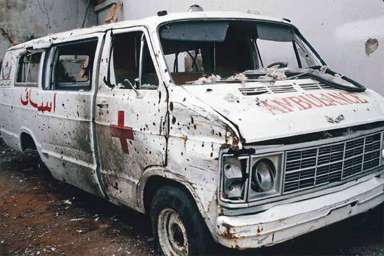Health care in crisis zones

As health care workers, some of us travel to resource-limited settings to deliver care where needs are the greatest. Due to various factors, which range from economic inequality among citizens, political instability, natural disasters, conflict or warfare, many of these places are also some of the most dangerous. As a result, health care workers can find themselves working side-by-side to crime; and even becoming the target of directed threats or violence. Those who are willing to put themselves on the front line in order to help others, can themselves end up being actively targeted. Aside from a stint in Afghanistan in 2013 and a few fleeting visits to some of the more dangerous regions within the African continent, I never truly considered being at risk from doing my job.
As a doctor I've been guilty of feeling like I have immunity. As if there is some fluorescent sign above my head saying "I'm an emergency doctor – don't harm me. I'm here to help." Risk perception is entirely subjective, and the degree to which that risk is perceived and then individual decisions are based upon this risk, differ. Familiarity with known risks can, at times, breed complacency.
Any illusions about my "doctor immunity" were recently crushed when I was kidnapped in broad daylight in Dar es Salaam, where I am currently living. While I was held captive for three hours and not physically hurt, critical incidents such as these are rarely factored into plans and preparations for working abroad. Yet violence against health workers is a key and overlooked humanitarian issue in our current global climate. Doctors and health workers may be seen as targets as they treat anyone, regardless of their political affiliation.
An International Committee of the Red Cross (ICRC) study found that there were 1800 incidents involving serious acts or threats of violence to health care workers across 23 countries between 2012 – 2013; and it is likely that many more incidents go unreported. In response to growing concerns surrounding the safety of healthworkers,, the ICRC launched the "Health Care in Danger" initiative, which aims "to address the widespread and severe impact of illegal and sometimes violent acts which obstruct the delivery of health care." (Durham). Since then, there has been renewed attention on this issue. During a recent World Health Assembly, WHO Director-General Margaret Chan stated that health workers are under attack like never before. Indeed, health care workers are at greater risk today than than they were when the Geneva Conventions were originally being drawn up. The intensity of threats and attacks to doctors have increased.
In the last few weeks, we have seen hospitals in Syria being deliberately targeted by violence and crime, reaching the highest levels in a single month since the start of the conflict. A bomb blast on June 10 in Aleppo resulted in damage to medical equipment, pharmacy stores and the post-operative room, resulting in compromised delivery of much-needed health services. A hospital in Busra was hit by 10 barrel bombs on June 15, destroying the only facilty in the province providing dialysis and neonatal care. Médecins Sans Frontières (MSF) have repeatedly called for respect of international humanitarian law and respect for medical staff, medical facilities and civilians accessing these.
It must also be recognised that there is a multiplier force at work here. When violence prevents health care workers from reaching those who are in greatest need of attention, people continue to suffer illness and injury without adequate treatment. This knock-on effect may be in the form of physical injury or a mental health issue, such as post-traumatic stress. Violence may also directly affect the health facilities that are providing treatment; hence violence and crime may undermine the already fragile health infrastructure. Hence a vicious cycle ensues with violence and crime contributing to health care needs being even greater in these settings.
So what can be done to address insecurity in the field? Coupland, who spearheaded the Health Care in Danger project, states that the health care community "must recognise this issue and be able to communicate about it." Proper security training is essential for anyone working in a conflict area and many of the large medical humanitarian organisations will ensure all their employees receive this. Having been a recipient of MSF's security training, I was able to employ many aspects of this whilst being held captive. Strong government policies to prevent violence and crime, including upholding international humanitarian law and human rights law, is essential, but often difficult in settings where governments may be weakened, destabilised or corrupt. The global health community has taken awhile to recognise that conflict, violence and insecurity are not just constraints to health care delivery – as Coupland states:: "they can be showstoppers."
So when it all goes wrong, what do you do?
Despite all this, when things go wrong, humans usually find a way of rebuilding the things that have been stripped away from them. You find a way of rebuilding the bubble of security that was once wrapped around you and has since been brutally torn away. You find a way of restoring your optimism for life and work. You remember why you traveled abroad and the reasons why as a health care provider, you are willing to put yourselves at risk in order to help others.
The important thing to remember when embarking on global health work is that things can go wrong. We don't have absolute immunity. But with adequate training, awareness and precautions, it is possible to make them go right again, too and prevent a dangerous experience from being a showstopper.
This story is republished courtesy of Plos Blogs: blogs.plos.org.




















